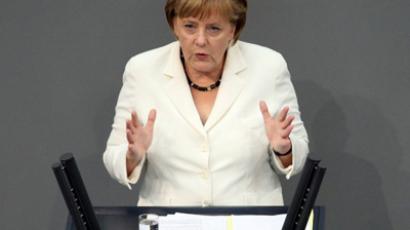Rescue mechanism for EU meets resistance in Germany
Germany’s participation in Europe’s fiscal pact and the bailout fund known as the European Stability Mechanism is being challenged in the courts by German lawmakers, a democracy group and trade unions.
The left opposition party Die Linke – the only party to oppose the plans in the Bundestag – applied a complaint at the Karlsruhe-based Federal Constitutional Court, claiming the fiscal pact and the ESM breach powers of German lawmakers. Besides them, the group “Europe Needs More Democracy”, the union of taxpayers, as well as Peter Gauweiler, a lawmaker from the Bavarian sister party of Chancellor Angela Merkel’s Christian Democrats, and former Justice Minister Herta Daeubler-Gmelin also filed separate suits opposing the parliament’s decision.Late on Friday, two thirds of Germany’s parliament the Bundestag approved the fiscal pact and the country’s participation in the ESM, which have been promoted by Angela Merkel. The Bundesrat, representing Germany's 16 states, also voted in favor for measures several hours later.The new laws need the signature of German President Joachim Gauck to come in force. But Gauck said, he plans to delay signing the bills until the Constitutional Court rules out whether they are within German law. The proceedings could take a few weeks.Meanwhile German Justice Minister Sabine Leutheusser-Schnarrenberger pointed out that the country’s top court won’t stop the country from participating in the ESM as the parliament approved it.“The Constitutional Court has in the past set principles for individual bills, but it has not fundamentally objected to aid measures” for ailing Eurozone member states, Leutheusser-Schnarrenberger told Passauer Neueste Nachrichten daily.Currently 25 of the EU's 27 member states have approved the fiscal growth pact. Britain and the Czech Republic did not ratify the agreement. Under the terms of the fiscal deal, the EU countries must keep their annual budget deficits within certain level or face sanctions.Political risk consultant John Hulsman believes Chancellor Angela Merkel has a tough job trying to balance a speedy pace of reforms with due democratic procedures. “Part of the problem for her is that she needs to move faster than the glacial pace of the European summits,” Hulsman explained to RT. “Markets can move millions of dollars with a flick of a keyboard. So she knows she has to move faster. But if she goes too fast, there isn’t due process, meaning there is no time to deliberate over this in parliament, and there isn’t time, then, for judicial review in the courts. So if she does move too fast, she loses the democratic legitimacy, which is vital if she’s going to bring Germany along with her. So she’s stuck between a rock and a hard place.”














